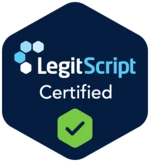Substance Abuse Treatment Programs
Compassionate, evidence-based care designed to address the physical, emotional, and psychological aspects of addiction, empowering individuals to achieve lasting recovery in a supportive environment.
Comprehensive, Evidence-Based Care for Long-Term Recovery
At Trinity River Recovery Center, we understand that substance use disorder is a complex disease that requires compassionate, personalized treatment. Our Substance Abuse Treatment Programs are designed to help individuals achieve recovery by addressing the physical, emotional, and psychological aspects of addiction in a supportive and judgment-free environment.

What Is Addiction?
Addiction is a chronic disease characterized by repetitive, compulsive use of mind-altering substances despite harmful consequences. It affects brain chemistry, altering how individuals experience pleasure, make decisions, and interact with others around them. Addiction is not a moral failing but a medical condition that requires professional care. Substances that commonly lead to addiction include:
- Prescription Drugs: OxyContin, Xanax, Percocet, and others.
- Alcohol: A leading cause of preventable death worldwide.
- Illegal Drugs: Heroin, methamphetamine, and cocaine.
Warning Signs of Addiction
Recognizing addiction in yourself or a loved one is the first step toward recovery. Signs include:
- Spending significant time acquiring, using, or recovering from substance use.
- Continuing use of the substance despite negative physical, emotional, or social consequences.
- Experiencing prolonged withdrawal symptoms when not using.
- Developing a tolerance that requires higher doses to feel the same effects.
- Neglecting responsibilities or relationships in favor of substance use.
If these behaviors resonate, it may be time to seek professional help.
Find out how personalized care, evidence-based therapies, and dual diagnosis support work together to treat substance use disorder comprehensively.
Here 24/7 To Answer Questions About Our Treatment Program
Treatment Options at Trinity River Recovery Center
We provide a comprehensive approach to treatment, offering individualized care tailored to each patient’s unique needs
Medically Supervised Detox
Detoxification is often the first step in recovery. Our medically supervised detox programs ensure a safe and comfortable withdrawal process:
- Medications like buprenorphine and naltrexone can reduce cravings and withdrawal symptoms.
- Around-the-clock monitoring ensures your safety during this critical phase.
Behavioral Therapies
Our therapy programs address the underlying causes of addiction and equip patients with tools for long-term recovery.
- Cognitive Behavioral Therapy (CBT): Teaches patients to identify and change harmful thought patterns.
- Trauma-Informed Care: Addresses past traumas that may contribute to substance use.
- Experiential Therapy: Encourages healing through activities like art, music, or outdoor experiences.
- Family Therapy: Rebuilds trust and communication within families.
Dual Diagnosis Treatment
Many individuals struggling with addiction also face mental health challenges like anxiety, depression, or PTSD. Our dual diagnosis programs address both conditions simultaneously, reducing the risk of relapse and promoting holistic healing.
Aftercare and Support Groups
Recovery is a lifelong journey. Our aftercare programs and connections to support groups like SMART Recovery or Alcoholics Anonymous provide ongoing encouragement and accountability.
How Addiction Develops
Addiction often begins innocently with the use of substances to manage pain, stress, or mental health challenges. Over time, the brain’s reward system becomes dependent on the substance, leading to compulsive use. Understanding these factors helps us create personalized treatment plans that address the root causes of addiction. Factors That Contribute to Addiction:

Why Choose Our Recovery Center?
At Trinity, we are dedicated to providing:
- Comprehensive Care: From detox to aftercare, we support every stage of recovery.
- Personalized Treatment: Customized plans based on your unique needs and goals.
- Compassionate Staff: A team of experienced professionals committed to your success


